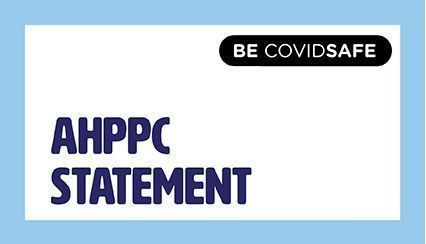
The Australian Health Protection Principal Committee (AHPPC), on the advice of the Communicable Diseases Network Australia (CDNA), has revised the previous AHPPC statement on 6 July 2020 on managing health risks as COVID-19 measures lift.
AHPPC is pleased to note the increasing uptake of COVID-19 vaccination across Australia. Data from clinical trials and real-world evidence demonstrates that COVID-19 vaccines available in Australia are very effective against hospitalisation and death from COVID-19.
Even where there is community transmission of COVID-19, increased vaccination coverage in Australia will allow people, including those at higher risk of becoming severely ill from COVID-19, to continue attending work and other settings with appropriate precautions in place where public health restrictions allow.
Australians should:
- monitor current public health advice
- get vaccinated
- continue physical distancing
- wear a mask as directed by local public health authorities
- use hand and respiratory hygiene and
- stay home and get tested when acutely unwell.
Individual risk factors
Anyone who gets COVID-19 can develop severe disease. However, the likelihood of getting severe COVID-19 illness increases with older age and the presence of certain health conditions. This risk can be reduced by getting vaccinated against COVID-19.
Age is by far the strongest risk factor associated with disease and death. Risk increases as people age. There is a very substantial increase in risk of severe COVID-19 illness in unvaccinated people over 70.
Some medical conditions may also increase risk. People at high risk of severe COVID-19 illness include those who are unvaccinated and who:
- have had an organ transplant and are on immune suppressive therapy
- have had a bone marrow transplant in the last 24 months or are on immune suppressive therapy for graft versus host disease
- have a haematologic (blood) cancer e.g. leukaemia, lymphoma or myelodysplastic syndrome
- have non-haematological cancer diagnosed within the past 5 years or on chemotherapy, radiotherapy, immunotherapy or targeted anti-cancer therapy.






